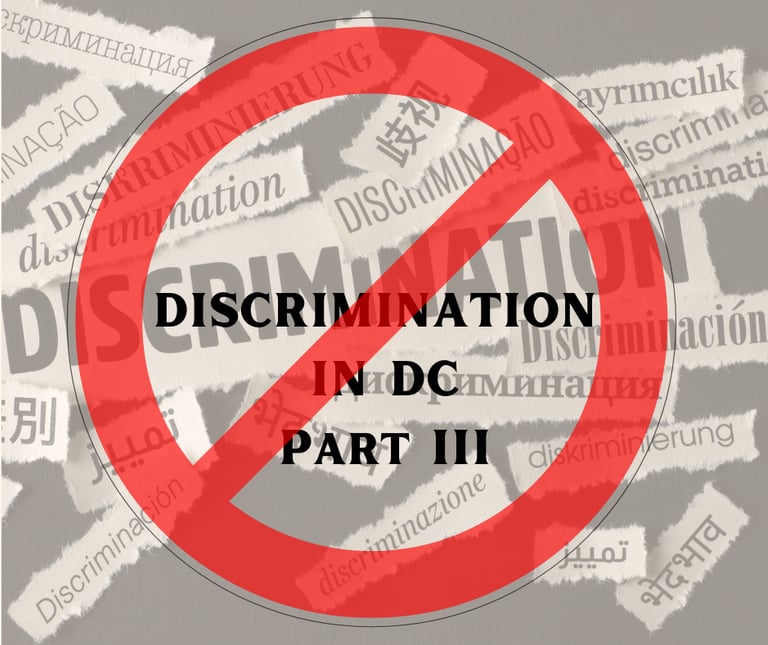DCHRA, Part 3: Protected Classes Explained
Explains the unusual protected classes under the DC Human Rights Act
Sonja DeWitt
3/1/20232 min read


Sex:
Under the DCHRA, the protect trait of sex includes "reproductive health decisions." Under DC Law "reproductive health decisions" is defined as:
" a decision by an employee, an employee’s dependent, or an employee’s spouse related to the use or intended use of:
a particular drug, device, or medical service, including the use or intended use of contraception or fertility control; OR
the planned or intended initiation or termination of a pregnancy." D.C. Code § 2-1401.02(27a))
So a company can't discrimination against someone for using birth control, for seeking or having an abortion, or for choosing not to have an abortion. And a company cannot discriminate against the spouse of a person who makes such decisions.
In addition, here are explanations for some of the less self-explanatory protected traits protected under the DCHRA.
Marital Status:
Employees or applicants cannot be discriminated against because of their relationship status, whether they are married, single, divorced, separated, in a committed relationship, etc. This status includes pregnancy and parenthood.
Familial Status:
Employees or applicants cannot be discrimination against based on their pregnancy, or their status as a parent, guardian, or caregiver with legal status of children under 18.
Family Responsibilities:
Someone who supports a legal dependent or blood relative, including children, parents and grandparents is protected from discrimination. Please note that this provision does not require companies to provide accommodation (e.g., time off) to fulfill family responsibilities.
Status as a Victim or Family Member of a Victim of Domestic Violence, a Sexual Offense, or Stalking (DVSOS):
Businesses cannot refuse to hire or take adverse action against an employee or applicant because they are a victim or family member of a victim of domestic violence, sexual offenses, or stalking.
Personal Appearance:
Related to a person's "outward appearance, irrespective of sex and gender identity or expression, including hair style and color, facial hair, tattoos, body size or shape, and body piercings, subject to business requirements and standards." That means that companies can require uniforms or set reasonable grooming and appearance standards.
In this blog, I'm only explaining the traits that need the most explanation. There are several more which I didn't discuss. If you have any questions about this topic, please contact me.
So...we've discussed the basics of the DC Human Rights Act and the 2022 amendments. There are also several unusual elements employers and employees need to understand about the protected traits under the DCHRA.
Several of the protected classes are not self-explanatory and need further explanation. This blog will discuss some of those traits. First, there are a couple of traits that are protected under federal law, but which are defined more broadly under the DCHRA. These are:
Age:
Most people are aware that the the federal Age Discrimination in Employment Act is intended to prevent discrimination against older workers--those over 40. However, the DCHRA is different. Under the DCHRA, every employee 18 and over is protected. That means that employees and applicants are protected from discrimination not only because they are perceived to be too old, but also because they are perceived to be too young. Therefore, under the DCHRA, an employer cannot consider age at all if the employee or applicant is at least 18, unless there's some other legal requirement related to age. (For example, under DC law, you have to be at least 21 to work as a bartender.)
Disclaimer: This blog is for informational purposes only and should not be interpreted as legal advice. If you need legal guidance on any of the issues addressed here, contact me or another attorney barred in DC for advice addressing your specific problem.
CONTACT INFO
Phone: 301-920-0975
Fax: 888-503-0680
Email: sonjadewitt@dewitteeo.com
Website: www.dewitteeo.com


